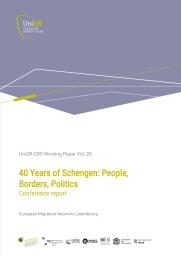Working Paper Vol. 26

To mark the 40th anniversary of the Schengen Agreement, the conference '40 Years of Schengen: People, Borders, Politics”, jointly organised by EMN Luxembourg and the UniGR-Center for Border Studies, of-fered a timely opportunity to celebrate European integration and critically analyse the evolving realities of border governance. Focusing on the free movement of people in border regions, particularly in the SaarLorLux area, the conference examined the socio-economic interdependencies, legal and political challenges that have arisen from the reintroduction of internal border controls. Panels and roundtable reflected on the shifting dynamics at the internal and external margins of the Schengen area, where migration, security discourse and geopolitical crises are reconfigured the Schengen spirit. Participants called for a renewed commitment to the core values of solidarity, trust, and shared sovereignty, emphasising that the future of Schengen requires political will and citizen engagement. The conference reaffirmed Schengen as a lived reality and a symbol of European freedom, as well as a strategic asset in times of uncertainty.

